No grousing behind the Duck
Saturday 7 July 2007
• 6 min read
This article was also published in the Financial Times.
As managing director of The Fat Duck in Bray, for which its chef Heston Blumenthal has justifiably won three Michelin stars and worldwide recognition, Tony Baker has one of the most enviable jobs in the restaurant world. But one that he arrived at via a most unusual route.
Although today many chefs have attained celebrity status their ascent to this questionable position is very different from the sportsmen or artists whose company they are now often seen in. To make a name for themselves, chefs need their own restaurants which will have required capital and financial assistance to get them started. When they finally emerge into the media spotlight they invariably have a long-term commercial partner alongside them, someone who has been either wise or brave enough to have spotted their potential early on.
Baker has, however, only held this position for three years and previously had no experience whatsoever of the restaurant business. Before we met he agreed with my comment that it was as if he had gone overnight from running an amateur football club to managing Manchester United.
But it is unlikely that any football manager would look as youthful at 60 as Baker, a fact he attributed to one of the most distinctive aspects of restaurant life. “Everyone I work with now is much, much younger than I am. Heston is only 41 and the average age of the rest of our staff no more than 25. It’s a wonderful feeling to work with such a young team and it reminds me of when I first started in the design world,” he explained.
Baker had spent all his career in graphic design, sales and marketing for large corporations citing his previous interest in restaurants only as “places to eat in” – although as someone who has lived and worked around Bray he followed the rise to pre-eminence of The Fat Duck since its inception in 1995. “I used to eat there a lot, “Baker continued, “far more in fact than I do today. Blumenthal then spent all his time in the kitchen and we developed a kind of nodding relationship. I watched the business grow and develop and saw for example the lavatories moved from a shed outside in the garden to more luxurious surroundings upstairs.”
Their lives changed in January 2004 when The Fat Duck received its third Michelin star (I was with Blumenthal that day in Madrid when he revealed he had only six booked for dinner that night, just enough cash in the bank to cover the next week’s wages and was the closest he ever came to going ‘belly up’ as he graphically put it). Overnight the reservations line began to ring non-stop (they now receive several hundred calls a day) and Blumenthal’s first reaction was to try and outsource this aspect of the business to a mutual acquaintance. Her response was that this was too small for her company to handle but put Blumenthal in touch with Baker.
“By then I was doing some small business mentoring so I came in and we talked for a long time,“ Baker explained. “Heston outlined his problems and I offered to come in to help him three days a week. But that arrangement only lasted a fortnight and since then I have been fulltime. I managed to solve the reservations challenge by hiring Melissa Lyons, who now looks after the logistics when Blumenthal and his team cook outside the restaurant, and we employ two fulltime on reservations who implement a strict policy whereby you can only book precisely two months in advance.”
As well as full responsibility for The Fat Duck Baker also has what he describes as ‘a watching brief’ over The Hind’s Head, the 400 year old village pub 100 yards away where Blumenthal has intelligently created a completely different menu based on traditional British dishes (and where I would like to eat once a week as opposed to once every six months at The Fat Duck).
Commercially, they constitute a significant business. The Fat Duck seats 46 (reduced from 52) for lunch and dinner six days a week and with 60-65% of its customers choosing the £115 tasting menu it generates an average spend of between £150 and £200 and an annual turnover of over £4 million. The spend at The Hind’s Head is much lower but its popularity means that it is now serving up to 250 customers a day generating a further £2.5 million. The restaurants’ turnover, in a company privately owned by Blumenthal, is significant with additional income from books and TV, handled by two separate agents.
Baker’s role, as he sees it, is to look after what is effectively a family business and to deliver the financial rewards Blumenthal deserves after several years of working 100 hours a week for very little. Given his scientific style of cooking which does not rely on expensive cuts of meat or fish I would imagine that although the challenge of managing the food cost element is easier than in restaurants of similar standing, on the other hand each dish requires far more intricate planning, design and execution which focuses Baker’s attention on that other vital aspect, the staff.
“There are 32 chefs at The Fat Duck who together with the restaurant team and the administration generate a weekly wage bill of between £32-£35,000 a week,” Baker explained. And when rather than how to manage his team has proved the biggest challenge. “Normal business patterns simply do not apply. Usually when you have a major issue in an organisation you call all the heads of departments together and sort it out. But when everybody is working long lunch and dinner shifts and then needing the time in between to get ready for the next one there is simply no time for meetings. You have to deal with whatever arises promptly but as efficiently as possible.”
This approach has obviously taken a big weight of Blumenthal’s shoulders. “He does accuse me of giving him a permanent red forehead from banging his hand there whenever I come up with some crazy and invariably expensive idea such as giving every customer an I Pod in a seashell for the course we call ‘Sound of the Sea,” Blumenthal confessed. “But it is wonderful to be working with someone who cares about the business and my family and who has finally helped me get out of the personal guarantees I needed to give to start the business.”
Baker has already come to several conclusions about The Fat Duck. Despite continuous offers from around the world they will not open elsewhere which will sadly not make securing reservations any easier. He also says that working alongside Blumenthal, whom he described as ‘an incredibly determined perfectionist and a gentleman to all he meets’, has been an enthralling experience but what he has found most extraordinary has been working at this elevated level of a profession where everyone knows that this is what they want to do and their dedication is so pronounced.
His only regret is that he now eats in The Fat Duck far less often than he used to and that he does it is to taste new dishes straight from their kitchen laboratory. But this is unlikely to lead to an early departure. “It’s just too much fun,” according to Baker.
Nick reminisces…
My last meal at The Hind's Head began and ended unforgettably.
As we drove into Bray our car picked up a puncture and just limped into the car park opposite the pub. Our tall Australian friend missed the sign on the low beam above the entrance which reads 'Duck or Grouse' and cracked his head (he recovered quickly with a stiff drink and was so impressed with the food that he returned the following week with fellow Australians). And at the end of lunch the waiters had to come round to every table to ask all the customers to remind them of what they had eaten and drunk because their computer system had crashed and they had no record of the orders for their bills.
In the interim we enjoyed several traditional British dishes each elegantly executed: soused herring with beetroot and horseradish; potted shrimps with toast; lemon sole with brown shrimps and spiced butter and a luscious Eton Mess, that unctuous combination of strawberries, meringue and cream. Alongside were a refreshing salad of Amalfi lemons; broccoli with almonds and anchovies and what has justifiably become the pub's signature dish, quaking pudding, a 17th century dessert Blumenthal has recreated with historians from Hampton Court. With drinks the bill came to just over £140 for four.
The Fat Duck, High Street, Bray, 01628-580333, www.thefatduck.co.uk
The Hind’s Head Hotel, High Street, Bray 01628-626151, www.thehindsheadhotel.com
Choose your plan

This February, share what you love.
February is the month of love and wine. From Valentine’s Day (14th) to Global Drink Wine Day (21st), it’s the perfect time to gift wine knowledge to the people who matter most.
Gift an annual membership and save 25%. Offer ends 21 February.
Member
$135
/year
Ideal for wine enthusiasts
- Access 289,504 wine reviews & 15,905 articles
- Access The Oxford Companion to Wine & The World Atlas of Wine
Inner Circle
$249
/year
Ideal for collectors
- Access 289,504 wine reviews & 15,905 articles
- Access The Oxford Companion to Wine & The World Atlas of Wine
- Early access to the latest wine reviews & articles, 48 hours in advance
Professional
$299
/year
For individual wine professionals
- Access 289,504 wine reviews & 15,905 articles
- Access The Oxford Companion to Wine & The World Atlas of Wine
- Early access to the latest wine reviews & articles, 48 hours in advance
- Commercial use of up to 25 wine reviews & scores for marketing
Business
$399
/year
For companies in the wine trade
- Access 289,504 wine reviews & 15,905 articles
- Access The Oxford Companion to Wine & The World Atlas of Wine
- Early access to the latest wine reviews & articles, 48 hours in advance
- Commercial use of up to 250 wine reviews & scores for marketing
More Nick on restaurants
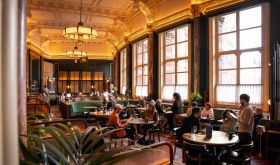
Nick on restaurants
Nick reports on a global dining trend. Above, diners at Hawksmoor in London. My frequent conversations with our restaurateur son...
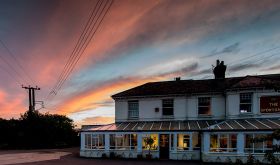
Nick on restaurants
Nick denies an accusation frequently levelled at restaurant critics. And revisits an old favourite. Those of us who write about...
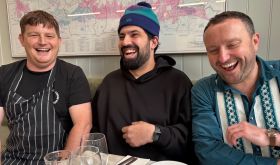
Nick on restaurants
A winning combination in North London beguiles Nick, who seems to have amused the trio behind it. Above, left to...
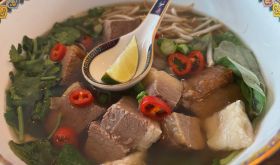
Nick on restaurants
Nick highlights something the Brits lack but the French have in spades – and it’s not French cuisine.
This week...
More from JancisRobinson.com
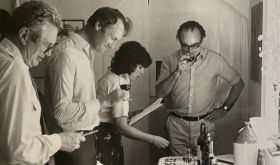
Inside information
1947 first growths a-go-go. Things were very different when this annual tasting got off the ground. Above, at the prototype...

Mission Blind Tasting
What you need for a successful blind tasting, and how to set one up. For background, see How – and...

Tasting articles
The last of three articles devoted to the 200-odd 2022 bordeaux tasted blind in this year’s Southwold-on-Thames tastings. See my...

Free for all
It’s time for a reset from vineyards to restaurants, says Robert Camuto. A long-time wine writer, Robert recently launched Italy...
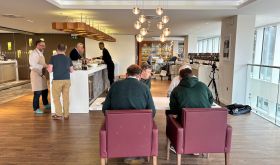
Tasting articles
See this guide to our coverage of 2022 bordeaux, and our report on the 2022 bordeaux whites tasted during this...
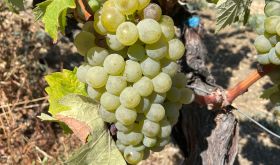
Free for all
This morning at Wine Paris, Dr José Vouillamoz and Seyit Karagözoğlu of Paşaeli Winery made the surprising announcement that Kolorko...
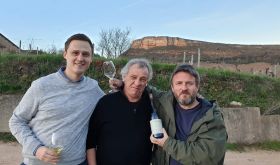
Tasting articles
The first of three reports on this year’s blind tasting of significant four-year-old bordeaux. See Bordeaux 2022 – a guide...

Free for all
Jancis revels in the glorious 2025 Loire vintage, and her tasting of dry whites identifies some excellent 2024s, too. A...
